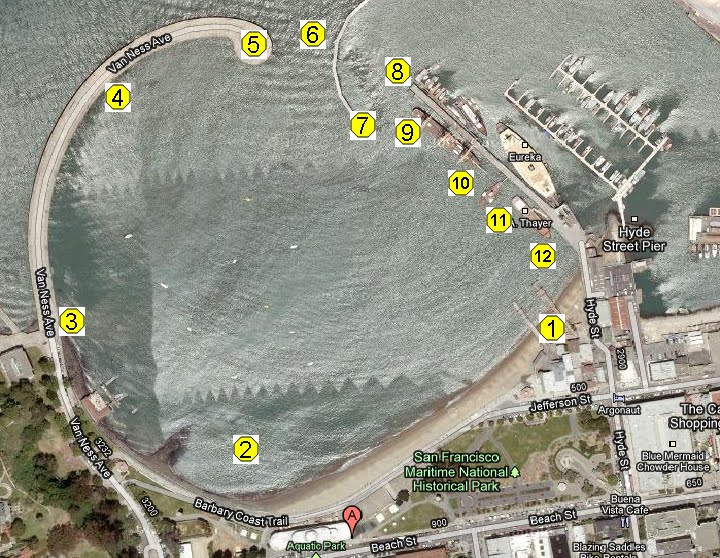Friday 11/6/09
Sharks do cruise in San Francisco Bay. A couple of times, in moments of stark irony, I’ve seen a sea lion slinging a three and a half foot leopard shark from side to side like a dog with a rag toy. They would flip the shark in the air, catch it back in their mouths, and continue to shake vigorously. Once, on a Gas House Cove swim, a fisherman at the Roundhouse on Muni Pier hauled a small shark directly over the head of the swimmer I was piloting. The shark disappeared quickly over the concrete railing and no one other than the fisherman and I (and the shark) saw what happened. There are at least eleven species of shark in the Bay, but none are hazardous to humans.
At least, that was the popular theory until recently. In the San Francisco Chronicle this week, Peter Fimrite reports on a study published in the Proceedings of the Royal Society B. The study is purported to be the most detailed analysis to date of the great white sharks of North America. The researchers recorded multiple visits within the confines of the Bay. Apparently, due to migratory habits, these visits typically happen between August and December. According to Barbara Block, a professor of Marine Sciences at Stanford’s Hopkins Marine Station and co-author of the study, "What we see on our acoustic monitoring devices is that the sharks stay pretty close to pinnipeds.” Whoops!
Most swimmers don’t worry about sharks in the English Channel. The NYC Swim web site offers answers to frequently asked questions regarding a swim across the “ditch.” They emphatically state, “There are no self-respecting sharks in the English Channel. It’s too far north and too cold.” This sentiment is echoed on other sites. On the other hand, Philip Vas from the South-East Fisheries Center, Miami Laboratory, reports in the Environmental Biology of Fishes journal that the shark catch of 1978 in the western English Channel included 118 blue sharks from the fishery at Looe in Cornwall, UK. In fact, the website for Looe proudly proclaims the town is, “the headquarters for British shark fishing.”
According to Wiki, “blue sharks are considered dangerous and have attacked humans. While they are one of the 20 or so species of shark considered dangerous, they rate on the low end of that spectrum.” Wiki then drily remarks that a citation is needed. They do have a citation for the claim that, “As of 2008, there are only four records of blue shark related human fatalities.”
Sharks don’t rate high on my list of concerns. I’m much more concerned about jellyfish, weather, shipping traffic, training schedule, feeding regimen, and jet lag. If I can get these things right (and have luck with the jellyfish, weather and shipping traffic), I’ll take my chances with the sharks.
6 years ago


No comments:
Post a Comment